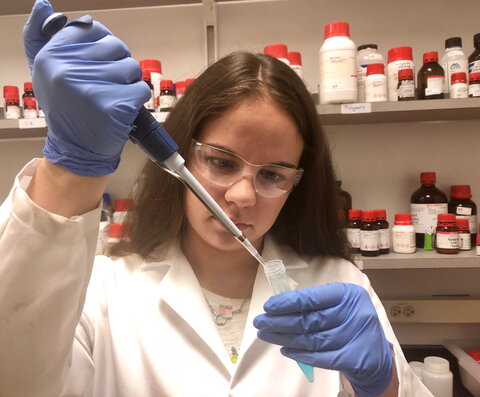
By Alayna Johnson, SCS Student Advising Leader 2018-2019
Many people find lab courses even more challenging than lecture courses, especially in chemical engineering and specialized chemistry. Here are my top tips for doing your best in these difficult but rewarding courses.
- Prepare, prepare, prepare.
The only way to have a good experience during the experiment is to prepare yourself outside of the lab. This means that your lab manual is your best friend. Study each experiment carefully and copy the procedure into your notebook with as much detail as possible. Leave blanks to record masses and other observations during the experiment. Visualize yourself carrying out each step.
In my freshman lab courses, I developed a routine of reading my lab manual, making a list of specific questions, and asking them during office hours every week before lab. This helped me to be efficient and knowledgeable during the experiment.
- Choose your lab partner wisely and communicate well.
Your lab partner needs to be someone you work well with and someone you can rely on. Once you’ve found a good fit, exchange contact information and arrange mutually convenient times to meet. A great tip is to touch base with your lab partner a few days before lab and make a game plan: Who is going to gather supplies? Who is going to get in line at the weigh station? Who is in charge of writing down data?
After the experiment, exchange any data or observations between you and your partner. You will be writing separate lab reports, but your partner is still a great resource if you get stuck on analyzing a piece of data or structuring a sentence. Additionally, consider proof-reading each other’s reports before submission.
- Form a relationship with your TA.
One of the major differences between lecture courses and lab courses is that in the latter, you’ll be assessed almost entirely by a TA, making it extremely important to establish a positive working relationship with them. During the lab, be ready to stay late to help clean up and provide assistance to other students whenever possible. Outside of the lab, go to office hours, ask insightful questions, and learn what your TA looks for in a good lab report. This will help you put your best foot forward come grading time.
- Put in the time.
There is one thing even more important than your chemical intuition or your lab skills and that’s a willingness to clock some serious hours writing your reports. In both CHEM 203 and 205, there may be small accuracy and technique components, but the large majority of your grade will be determined by your lab reports. This makes it all the more important to really give your reports the time and effort they deserve. I suggest blocking out 4-8 hours per week (depending on the lab) to prepare an outstanding report. This may sound like a lot, but remember you can split this up across several days and even work alongside a friend.
Bonus tip: Some labs take two or more weeks to finish, meaning you won’t have a lab report due on the off week. Time to relax? Think again. This is the perfect time to get a head start on what will be a long report. Prepare your introduction, procedure, and complete as much of the discussion section as possible.